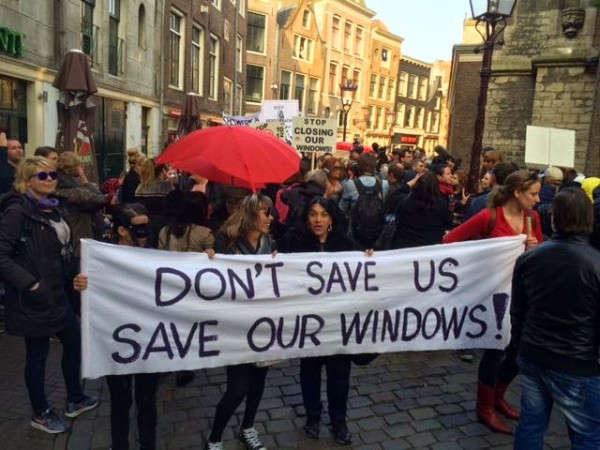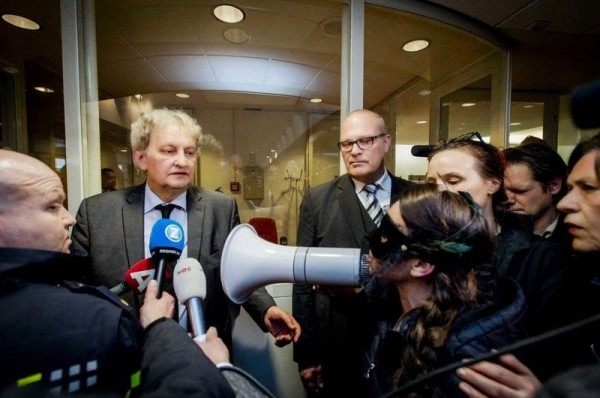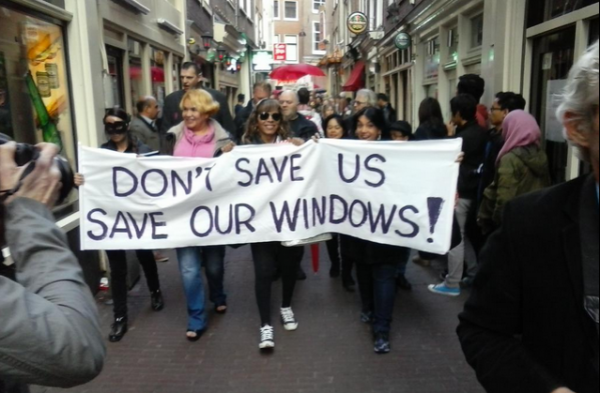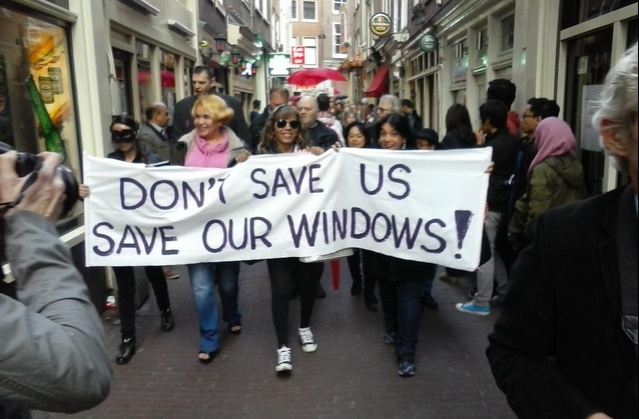
On April 9th, over 200 Amsterdam sex workers and their supporters protested the closing of legal sex businesses in the Red Light District by the city council. The demonstration consisted of a march from the Amsterdam Red Light District to city hall, where the protesters handed a letter to the mayor demanding the reopening of their closed workplaces and the active participation of sex workers in the city’s policy regarding their jobs.
Project 1012
Amsterdam has closed down at least 109 windows already as part of Project 1012, an initiative to bring the number of legal window workplaces down by 40% from 476 to 284. Project 1012, named for the Red Light District area code, is a massive gentrification project aimed at ridding Amsterdam center of “low value” businesses like marijuana coffee shops and the windows.
Government officials consider closing down legal work locations for sex workers an effective measure to prevent trafficking because they believe these businesses to be “sensitive to criminal activity” (“criminogeen” in Dutch, a new word invented solely to justify this policy) simply because they are part of the sex industry. Ironically, even local police voiced a preference for reopening the windows in order to keep sex work legal and visible.
The demonstration, the first of its kind in the Netherlands, was facilitated by PROUD, a sex worker-led union that launched earlier this year. The letter they addressed to Mayor Everhard van der Laan, demanding that the city stop closing windows and reopen closed brothels, as well as actively include sex workers in the city’s sex work policy, was signed by nearly a thousand supporters, many of whom are Red Light District sex workers themselves.
The mayor dismissed the sex workers’ concerns by saying that “the war is over,” maintaining that the issue has already been concluded decisively. He asked the protesters, “You tell me in what other city sex workers can demonstrate in these numbers in the streets,” implying that sex workers should be grateful for the rights they already have. He also stated that the city had already decided to close down fewer brothels, though this policy decision was actually motivated by the city council’s desire to lower Project 1012’s 108 million euro budget.

A local example of a nationwide problem
The large-scale closure of legal sex work locations and escort businesses and the refusal of cities to support new sex industry businesses, especially those businesses run by independent sex workers, is at the heart of the problems sex workers in the Netherlands face today.
In 2000, the Netherlands introduced a permit system for sex work businesses, giving most existing businesses a permit. Since then, according to government research, about 40% of sex worker businesses have lost their permit while only a handful of new businesses were allowed one. Over one in four cities’ policy is not to give out new permits at all, which is illegal, although officials are preparing to implement new laws to legalize this practice.
Because it is nearly impossible to start a new independent sex work business and many existing businesses are disappearing, working conditions in the legal sex work system are becoming more exploitative. Sex workers are especially vulnerable to financial exploitation, it being common for sex workers in clubs to pay 50% of their income as “rent” to their landlords. While sex workers are self-employed on paper, it is also common for escort agencies and brothels to demand an employee-employer-like relationship and forbid client contact outside their communication channels. This leads more and more sex workers to switch to the illegal sector, working without a permit, which leads to all the vulnerability of hiding from the law and an increasing culture of harassment by police, who often raid independent sex workers’ workplaces in search of ‘trafficking victims’.
Strangely enough, the public debate on sex work revolves mainly around sex workers working behind windows, which is the only form of sex work in the Netherlands that allows for sex workers to be self-employed both on paper and in practice, renting space for fixed rates and registering at the Chamber of Commerce. However, Warner ten Kate, the Dutch national public prosecutor on trafficking, has stated repeatedly that he wants to abolish window prostitution, which in his opinion presents women as “pieces of meat on display.”

An important year in Dutch sex worker rights activism
2015 has been an important year so far for Dutch sex workers. After years of public debate led by the Christian Union political party, which claims that sex work is “unworthy and against God’s will” in its party program, sex workers are finally getting heard in politics as well as the media.
Largely accountable for this new interest in sex work from a labor rights perspective is the new sex worker union PROUD, which launched in February. The organization made headlines earlier when socially conscious bank Triodos refused them a bank account for purportedly being associated with pornography. While the bank applauded PROUD for their effort to protect vulnerable sex workers in the porn industry, they stated they have a policy not to do business with organizations involved with pornography since they believe porn workers are inherently vulnerable.
A new wave of individual sex workers speaking out is having surprising impact as well. An inspiring example is Felicia Anna, the migrant sex worker and Amsterdam sex workers’ rights activist who personally handed the protesters’ letter to Mayor Eberhard van der Laan during the April 9th demonstration.
Felicia Anna recently posted an entry in her blog about a letter she discovered by Mayor van der Laan addressed to the Dutch ministry of Safety and Justice, requesting an exception to privacy laws in the case of Dutch sex workers in order for the city government to gain access to records on their “mental and physical health,” focusing specifically on “personal records concerning [their] sexual life.”
As a direct consequence of Felicia Anna’s post, MP Magda Berndsen-Janssen demanded that Dutch Minister of Safety and Justice Ard van der Steur address the human rights violations sex workers suffer and present a plan to protect their legal rights in the House of Representatives (Tweede Kamer), the main Dutch political arena.
Amsterdam sex workers are not ready to concede their war against a city that they feel does not understand or represent them. Or, in the words of Felicia Anna: “The war will be over when you give yourself in, Mr. Van der Laan, and until that time I will bring down a world of trouble and political pressure on you, (…) because you really pissed us off!”

The war indeed isn’t over yet, in fact, last Friday sex workers occupied three of the eighteen window brothels that were closed down that day, protesting against the closures of these windows brothels. PROUD has also filled a court case the same for the sex workers against the mayor of Amsterdam, demanding to re-open the window brothels and for the sex workers to be compensated for each day they can’t work in these brothels.
You can read more about it on the blog of Felicia Anna here: http://behindtheredlightdistrict.blogspot.nl/2015/05/prostitutes-occupy-closed-window.html
The war indeed isn’t over, like my fiance Felicia Anna stated correctly, and Hella Dee quoted. In fact, the war has just begun. I foresee much more of a struggle for politicians and especially the mayor of Amsterdam in the future in their crusade against sex work.
If you wish to read translations of some of the sources mentioned in your above piece, incl. the letter from Amsterdam’s mayor Eberhard van der Laan to the justice minister to enquire if there was a way to “legalise” violating sex workers’ privacy rights, the response to that letter from PROUD’s chairwoman Mariska Majoor, and the subsequent parliamentary inquiry that followed by MP Magda Berndsen-Janssen, you can read a guest post by Frans van Rossum on Research Project Korea, which includes links to the respective translations he created. It also includes a translation of the petition which PROUD handed over to the mayor, a translation of a Dutch newspaper article about the “Occupy Brothel Initiative”, and some quite interesting footnotes, including one about the history of sex work legislation in the Netherlands, which is important to understand as context for the legal uncertainties through which sex workers are required to navigate. As Frans said in closing, “This is the stuff that history is made of.”
“Sex workers in the Netherlands are making history”
http://wp.me/p294H2-1h1